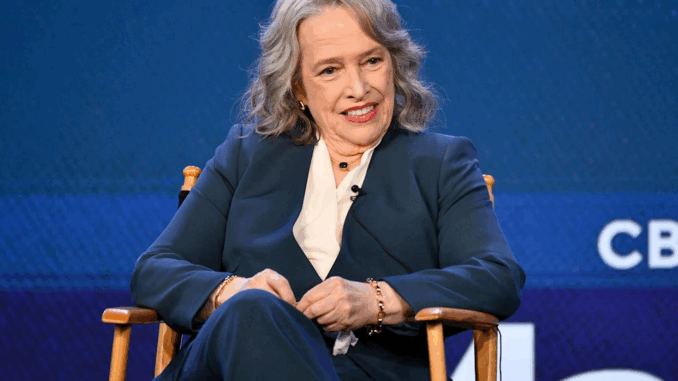
The Woman at the Edge of Herself
When we first meet Evelyn Couch in Fried Green Tomatoes, she is the embodiment of midlife discontent. Overweight, insecure, and overlooked, Evelyn is a woman suffocating in the margins of her own life. Her days are filled with bland meals, Weight Watchers meetings, and the crushing indifference of her husband, Ed, who cares more about TV dinners and football than his wife’s emotional needs.
She tries to please everyone, from the disinterested Ed to strangers in parking lots. She apologizes when bumped into. She listens but is rarely heard. Evelyn is a woman many viewers—especially women over 40—recognize all too well.
And yet, this quiet, repressed woman is about to meet someone who will shake her world in the best way.
Meeting Ninny Threadgoode: The Spark of Reawakening
Everything begins to change when Evelyn visits a nursing home and meets Ninny Threadgoode, a chatty elderly woman with a sparkle in her eye and a gift for storytelling. Ninny begins to recount tales of Whistle Stop, Alabama—a place where life was both harder and more vibrant, where people loved fiercely, worked with purpose, and fought for what mattered.
Through Ninny’s vivid stories of Idgie, Ruth, and the Whistle Stop Café, Evelyn begins to see herself differently. She starts to ask questions she had never dared to ask before: What do I want? Who am I really? Am I allowed to be angry? Can I be strong, wild, and worthy?
As Ninny recounts how Idgie Threadgoode defied gender roles and loved without shame, Evelyn sees a glimpse of a life she never imagined for herself—a life of boldness, defiance, and truth.
The Rise of Towanda: Anger, Humor, and Power

One of the most iconic moments in the film occurs when Evelyn, having just been rudely cut off in a grocery store parking lot, finally snaps. Instead of retreating, she rams the younger woman’s car with her own and joyfully shouts, “Towanda!”
This moment marks Evelyn’s symbolic rebirth. “Towanda” becomes her inner warrior—the version of herself that takes up space, speaks her mind, and refuses to be invisible. It’s humorous and cathartic, but it also represents something deeper: the reclaiming of agency.
Evelyn begins to transform. She takes self-defense classes. She throws out the rulebook that told her women must always be polite. She stops tiptoeing around Ed and starts living for herself.
Finding Purpose in Friendship and Food
The heart of Evelyn’s story lies not only in her personal transformation but in her relationships—especially with Ninny. Their intergenerational friendship is deeply moving and rare in cinema. Ninny gives Evelyn a window into a different way of living, but Evelyn gives Ninny something too: companionship, laughter, and the joy of being heard.
The Whistle Stop Café stories also reconnect Evelyn with something she hadn’t felt in years—nourishment, not just of body, but of soul. In the film’s final scenes, Evelyn decides to start selling Mary Kay products, help Ninny move in with her, and live with greater purpose. While it’s a small step, it’s a revolutionary one for someone who had spent a lifetime waiting in the wings.
Where Would Evelyn Be Today?
If Evelyn Couch were a real person today, she’d be in her 80s. But don’t expect to find her quietly knitting in a rocking chair. Evelyn’s second act would be her strongest. We can imagine her leading women’s empowerment workshops at her local community center or running a blog called “Towanda Speaks” that champions midlife reinvention.
Perhaps she owns a café inspired by the Whistle Stop Café—a warm, inclusive place where stories are shared, and every dish comes with a side of sass. Maybe she’s mentoring younger women, helping them find their voices sooner than she did.
She’s probably still with Ninny, sharing coffee in the morning and laughter in the evening. And if Ed is still around, he’s learned to cook for himself.
Legacy: Evelyn as a Symbol of Everyday Heroism
Evelyn Couch’s story may not be as dramatic as Idgie’s, but it’s no less important. She didn’t escape a burning building or fight a court case—but she escaped the prison of self-doubt. She fought her way out of silence and invisibility. She found herself through stories, sisterhood, and a little bit of rage.
She represents every woman who thought it was too late to change. Every person who believed they didn’t matter. Evelyn’s journey reminds us that transformation doesn’t require permission. All it takes is a spark—and the courage to fan the flame.
Conclusion: Towanda Forever
Evelyn Couch may have started her journey as a forgotten housewife, but she ended it as a warrior in her own right. She found her voice. She claimed her life. And in doing so, she became one of the most relatable and inspiring characters in Fried Green Tomatoes.
So, the next time life pushes you aside, just channel Evelyn, slam it into reverse, and shout with pride: Towanda!
